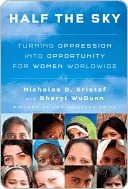More on this book
Community
Kindle Notes & Highlights
“Investment in girls’ education may well be the highest-return investment available in the developing world,”
India almost certainly has more modern slaves, in conditions like these, than any other country.
far more women and girls are shipped into brothels each year in the early twenty-first century than African slaves were shipped into slave plantations each year in the eighteenth or nineteenth
the best way to save them is to prevent them from being trafficked in the first place—which means keeping them in school.
Even in the United States, after all, what brought equal rights to blacks wasn’t the Thirteenth, Fourteenth, and Fifteenth Amendments passed after the Civil War, but rather the grassroots civil rights movement nearly one hundred years later.
In 2007, senators Joseph Biden and Richard Lugar first introduced the International Violence Against Women Act, which will be reintroduced annually until it becomes law. The bill provides for $175 million a year in foreign aid to try to prevent honor killings, bride burnings, genital cutting, acid attacks, mass rapes, and domestic violence. The bill would also create an Office of Women’s Global Initiatives
one of the key forces working in Europe’s favor was openness to new ideas, and that one of the best gauges of that openness was how a country treated its women:
Greg wrote about his work in his
powerful book, Three Cups of Tea,
Young women who can master computer skills can get jobs as soon as they graduate for $250 per month, several times what most young men earn.
educating girls is one of the most effective ways to fight poverty.
One of the most cost-effective ways to increase school attendance is to deworm students.
FemCare, the arm of Procter & Gamble that makes Tampax tampons and Always pads, started its own project to distribute free pads in Africa, but it ran into unexpected challenges. First, the girls needed a place to change their pads and clean up, but many schools lacked toilets. So FemCare began building toilets—with running water—at the schools, and that added hugely to the costs. Then the project
encountered cultural taboos about blood, such as resistance to disposing of used pads in the garbage. FemCare had to make special provision for the disposal of pads, in some places even distributing incinerators.
iodize salt.
iodine deficiency typically shaves ten to fifteen points off a child’s IQ.
iodine deficiency alone reduces humanity’s collective IQ by more than 1 billion points. According to one estimate, just $19 million
President Ernesto Zedillo how successful the experiment had been, and Zedillo bravely agreed to phase out food subsidies and launch the new program nationwide. The program is now called Oportunidades.
About one quarter of Mexican families are served in some way by Oportunidades, and it is one of the most admired antipoverty programs in the world.
The poor get cash grants in exchange for keeping children in school, getting them immunized, taking them to clinics for checkups, and...
This highlight has been truncated due to consecutive passage length restrictions.
payments are made directly by the central government, to reduce local corruption, and to mothers rather than fathers. That’s because research has shown that mothers are more likely to use cash for the children’s benefit, and because the payments elevate the status of the mothers within the household.
Oportunidades is particularly beneficial for girls, and some early studies suggest it will pay for itself by creating more human capital to power Mexico’s economy. The
some kinds of aid do work; those that have been most effective have involved health and education.
Microfinance has done more to bolster the status of women, and to protect them from abuse, than any laws could accomplish.
Capitalism, it turns out, can achieve what charity and good intentions sometimes cannot.
the United States ranked sixty-eighth among countries of the world in the share of women holding national political office.
women now lead Harvard, Princeton, and MIT, as well as the Ford Foundation and the Rockefeller Foundation.
The movement’s agenda should be broad and enveloping, while focusing on four appalling realities of daily life: maternal mortality, human trafficking, sexual violence, and the routine daily discrimination that causes girls to die at far higher rates than boys.


